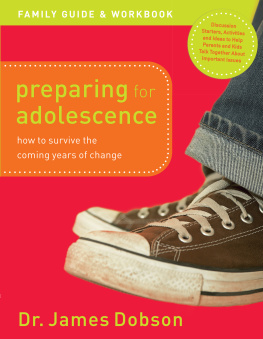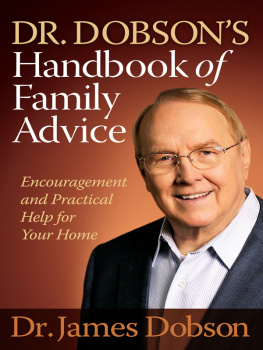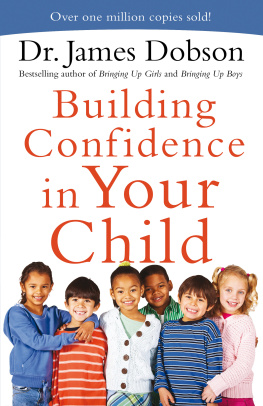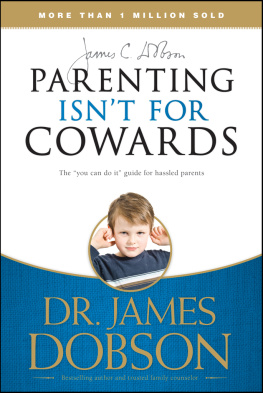2005 Gospel Light
Published by Revell
a division of Baker Publishing Group
P.O. Box 6287, Grand Rapids, MI 49516-6287
www.revellbooks.com
Revell edition published 2014
ISBN 978-1-4412-2794-2
Previously published by Gospel Light
Ebook edition originally created 2012
All rights reserved. No part of this publication may be reproduced, stored in a retrieval system, or transmitted in any form or by any meansfor example, electronic, photocopy, recordingwithout the prior written permission of the publisher. The only exception is brief quotations in printed reviews.
Library of Congress Cataloging-in-Publication Data is on file at the Library of Congress, Washington, DC.
Unless otherwise noted, Scripture quotations are taken from the Holy Bible, New International Version. Copyright 1973, 1978, 1984 by International Bible Society. Used by permission of Zondervan Publishing House. All rights reserved.
Other version used is The Everyday Bible, New Century Version, copyright 1987, 1988 by Word Publishing, Dallas, Texas 75039. Used by permission.
PREPARING TO PREPARE FOR ADOLESCENCE
Dear Parent,
Your preteen or young teenager is embarking on quite a journeyand taking the entire family along for the ride, as well. You can help your son or daughter prepare for this excitingand challengingpassage of life called adolescence.
A few of the things your child will need to know to survive this physical and emotional roller-coaster ride are:
Its naturally a time of stress and agitation.
The discomfort is almost universal. Even kids who seem entirely carefree feel uncomfortable at some time during adolescence.
The best news of all is that adolescence has a predictable beginning and a predictable end.
What to say
If youre like many adults, youre probably wondering just what you should say to your preteen to prepare him or her for the coming yearsand of equal importance, how you should go about saying it.
Lets begin with the what.
In his book Preparing for Adolescence, Dr. Dobson gives an example of a football coach in the locker-room with his team, minutes before the kickoff of a big game. No coach in his right mind would miss taking the opportunity to provide last minute instruction and summarize the important things hes been teaching his players all along.
You are not unlike that coach. Whether you are a parent, stepparent, guardian, foster parent or teacher, as your young player heads out onto the field, its time for a little pep talk; a time to reemphasize biblical values and give the last minute instructions your child will need to survive the pressures that will occur in the coming years.
And thats the whole purpose of this Preparing for Adolescence Family Guide: To help you summarize what your child needs to know about self-esteem, peer pressure, sexual development, emotional growth and independence, and a solid relationship with God.
How to say it
This leads us to the next question: how to go about communicating these valuable principles.
Its a well-known phenomenon that children and their parents are often suddenly transformed at the onset of puberty. Sometimes Junior may seem like a stranger. And from Juniors perspective, the word parent can be associated with a whole new set of adjectivesmany of them less than complimentary!
The dynamics of these changes demand solid communication skills. And building them takes time. And commitment. And practice!
The 20 sessions in this book will require a total of about three and a half hours of your time. May I suggest that you plan these hours carefully. Good communication doesnt just happenit takes effort.
But the effort pays off. As you practice a commitment to communication with your preteen, he or she will begin to develop vital skills needed later on in relationships with coworkers, friends, family and spouse. And you may very well find unexpected joy in developing a new person-to-person friendship with somebody who is no longer a child.
A few dos and donts
As you begin to use this Preparing for Adolescence Family Guide, youll want to remember these things:
1. DO work one-on-one. Including other siblings might hamper the effectiveness of each session. (In a group setting we suggest that you use the Preparing for Adolescence Group Guide. See information in the back of this book.)
2. DO plan your course with specific dates and timesbut dont get too businesslike about it. Relax! Have fun!
3. DO feel free to share from your own experiences as an adolescent and teen. Relating the memories of your own adolescence with your preteen gives you credibility as a guide whos been there and knows the ropes. This credibility takes you and your child one step closer to an adult-to-adult relationship. And it enhances your empathy toward your preteenputting you in touch with the many issues of adolescence. This does not mean that you have to communicate everything in your past including areas over which you feel regret or inadequacy. You can be as general or specific as you choose about past problems. If you dont want to elaborate, dont.
4. DO commit to a time schedule which is convenient for both you and your preteen. Dr. Dobson suggests that you approach this time together with an attitude of expectation and excitement and that you involve your preteen in planning the event. Some ideas that have created a profitable experience for others include the following:
A very effective plan is to schedule a onetime weekend getaway or retreat with your teen or preteen. Simply say, Would you like to go on a special trip that will help to prepare you for becoming a man (or a woman)?
On a trip by car, you and your preteen can listen to the CD version of Preparing for Adolescence (see information in the back of this book) as you drive, then work through the Family Guide exercises at stops. You might plan a special sightseeing tripeven a one-day retreat at a local park can provide the perfect setting for a memorable time for you and your child.
You might also consider these options:
Meet once or twice a week. There are 20 lessons and each should take about ten minutes, although some may last longer. You may also review two or more lessons at once. Between sessions you will need to read an average of eight pages of the book Preparing for Adolescence by Dr. James Dobson. You might want to encourage your preteen to read the book, as well, or listen together to the CD products that cover the same material.
Consider scheduling your sessions to coincide with a church youth groups study of the same material (see information about group material in the back of this book).
5. DONT worry about what to do. Just stick with the program and follow directions as they come.
6. DONT worry about seeing immediate results. Your preteen will be realizing the full value of these sessions over a period of years. He or she will still make mistakesperhaps significant ones. But in the painful consequences of mistakes, the security of your love and the bonds of communication strengthened during these sessions will go a long way.
7. DONT worry about having to be right all the time. Allow your child the precious knowledge that you are human, too, and that you may not always have the right answers.
It is best if your son or daughter reads the pages in Preparing for Adolescence (or you listen together to the CD segments that correspond with each Family Guide exercise ahead of time, although the guidebook can be effective alone as well. You will want to read Preparing for Adolescence (or listen to the CD segments) in advance of the time you will meet with your preteen. If you use the CD segments, listen ahead of time to CD 1. This CD contains additional background information that will help you use this material. Youll want to be prepared with pencils and paper for each session. Have a Bible handy for the sessions where it is used.
Next page








